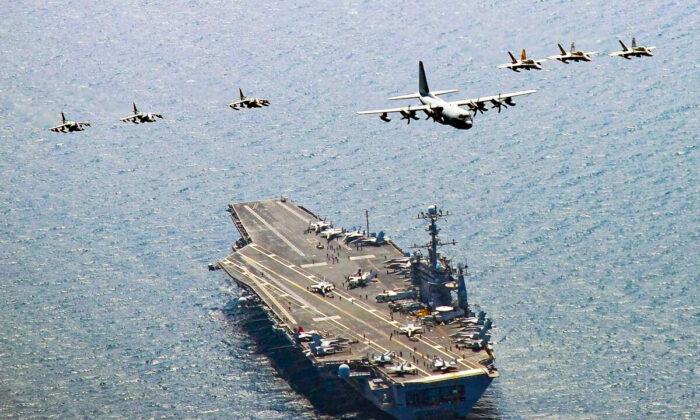The U.S. Navy will begin the process of allowing sailors to live off-ship following a number of deaths and complaints about conditions aboard the USS George Washington aircraft carrier, including three suicides in the month of April alone.
“The Commanding Officer of USS George Washington has taken steps to provide an opportunity to every Sailor who is currently living on the ship to elect to move to off-ship accommodations at a local installation,” Myers said.
The move comes as the Navy acts to manage fallout after confirming the deaths of seven sailors from the aircraft carrier over the past year, including four in 2021 and three in mid-April.
The Hill also reported the deaths by suicide of three additional sailors between November 2019 and October 2020, which have been confirmed by the Navy.
An investigation has been ordered to assess the deaths and examine “command climate and culture issues” aboard the ship.
“Adm. Daryl Caudle, commander, U.S. Fleet Forces Command, has directed Rear Adm. John Meier, commander, Naval Air Force Atlantic, to investigate and assess the reported deaths of sailors assigned to the USS George Washington,” U.S. Fleet Forces Command Capt. Sarah Self-Kyler told The Hill in a statement Monday.
Conditions Aboard ‘Not Always Great’: Navy Official
Issues about the habitability of the USS George Washington were raised with the navy’s top enlisted official during a visit on April 22.During an all hands call with the aircraft carrier’s crew, Master Chief Petty Officer of the Navy Russell Smith told sailors that when it came to habitability aboard, he wasn’t “going to have an answer that’s going to make you real happy.”
Smith explained that due to the safety and logistics requirements of the refuelling and complex overhaul process (RCOH) the ship had been undertaking since 2017, sometimes food services were reduced and the hot water was shut down.
“This is what happens on a carrier in RCOH, and at some point, you’ve got to shut some of the water down and shut some of the other hotel services down and they’re gonna have to move around who’s living on the ship in order to make it work and meet the safety requirements,” he said, adding that a certain number of crew had to remain aboard for safety reasons.
During the RCOH process, the ship’s crew undertakes some of the work while it’s in the dry dock, with Smith saying there was a “necessity for sailors to have ownership in this process.” He acknowledged that this meant the “conditions are not always great.”
Responding to a question from a sailor about the conditions not being “up to par,” Smith said that the Navy “probably could have done better to manage your expectations” of life on board while “you’re trying to fix a warship this size” in the dry dock.
Smith encouraged sailors to “always raise” their concerns with leadership, but “to do so with reasonable expectations and then understanding” of what the RCOH process was like.
He compared the conditions that sailors endured aboard the aircraft carrier with that of Marines sleeping rough on the dirt without “hot meals.”
“What you’re not doing is sleeping in a foxhole like a marine might be doing. What you are doing is going home at night, most nights, unlike the [USS] Harry S. Truman,” Smith said, referring to another Nimitz-class aircraft carrier currently stationed in the Mediterranean.
“So when you’re here, some of it is that you have some more stability in that you’re here. The downside is some of the [expletive] that you have to go through logistically will drive you crazy.”
He also told sailors that it was not easy to lure psychiatrists and psychologists to work for the Navy.
The USS George Washington, a Nimitz class aircraft carrier, has been dry docked for deep maintenance and a complex refuelling of its nuclear reactors at Newport News Shipbuilding in Virginia since 2017. The overhaul was due to be completed last year but works were extended due to labor shortages during the COVID-19 pandemic. They are now expected to be completed by the end of the year.
The three most recent crew deaths took place between April 9 and 15. Retail Services Specialist 3rd Class Mikail Sharp was found dead off-base on April 9. This was followed by the off-base death of Interior Communications Electrician 3rd Class Natasha Huffman on April 10. Both have been determined to be suicides.
“The death of any sailor is one too many, and we will thoroughly investigate these incidents to ensure we are providing the appropriate support and resources to sailors at sea and in the shipyards,” Naval Air Force Atlantic spokesperson Myers said.
A committee set up specifically in February by Defense Secretary Lloyd Austin for suicide prevention in the military will in May visit military installations and bases, and is expected to deliver a preliminary set of recommendations early next year.
The Epoch Times has contacted the Navy for comment.





